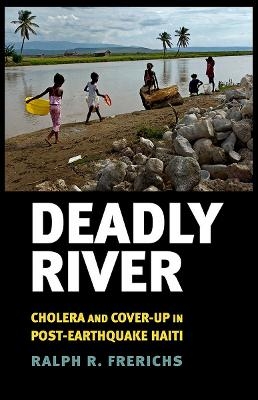
Deadly River
Cholera and Cover-Up in Post-Earthquake Haiti
Seiten
2017
Cornell University Press (Verlag)
978-1-5017-1358-3 (ISBN)
Cornell University Press (Verlag)
978-1-5017-1358-3 (ISBN)
In Deadly River, Ralph R. Frerichs tells the story of the Haitian cholera epidemic, of a French disease detective determined to trace its origins so that he could help contain the spread and possibly eliminate the disease, and the political intrigue that has made that effort so difficult.
In October 2010, nine months after the massive earthquake that devastated Haiti, a second disaster began to unfold—soon to become the world's largest cholera epidemic in modern times. In a country that had never before reported cholera, the epidemic mysteriously and simultaneously appeared in river communities of central Haiti, eventually triggering nearly 800,000 cases and 9,000 deaths. What had caused the first cases of cholera in Haiti in recorded history? Who or what was the deadly agent of origin? Why did it explode in the agricultural-rich delta of the Artibonite River? When answers were few, rumors spread, causing social and political consequences of their own. Wanting insight, the Haitian government and French embassy requested epidemiological assistance from France. A few weeks into the epidemic, physician and infectious disease specialist Renaud Piarroux arrived in Haiti.
In Deadly River, Ralph R. Frerichs tells the story of the epidemic, of a French disease detective determined to trace its origins so that he could help contain the spread and possibly eliminate the disease, and the political intrigue that has made that effort so difficult. The story involves political maneuvering by powerful organizations such as the United Nations and its peacekeeping troops in Haiti, as well as by the World Health Organization and the U.S. Centers for Disease Control. Frerichs explores a quest for scientific truth and dissects a scientific disagreement involving world-renowned cholera experts who find themselves embroiled in intellectual and political turmoil in a poverty-stricken country.
Frerichs's narrative highlights how the world's wealthy nations, nongovernmental agencies, and international institutions respond when their interests clash with the needs of the world's most vulnerable people. The story poses big social questions and offers insights not only on how to eliminate cholera in Haiti but also how nations, NGOs, and international organizations such as the UN and CDC deal with catastrophic infectious disease epidemics. Learn more at http://www.deadlyriver.com
In October 2010, nine months after the massive earthquake that devastated Haiti, a second disaster began to unfold—soon to become the world's largest cholera epidemic in modern times. In a country that had never before reported cholera, the epidemic mysteriously and simultaneously appeared in river communities of central Haiti, eventually triggering nearly 800,000 cases and 9,000 deaths. What had caused the first cases of cholera in Haiti in recorded history? Who or what was the deadly agent of origin? Why did it explode in the agricultural-rich delta of the Artibonite River? When answers were few, rumors spread, causing social and political consequences of their own. Wanting insight, the Haitian government and French embassy requested epidemiological assistance from France. A few weeks into the epidemic, physician and infectious disease specialist Renaud Piarroux arrived in Haiti.
In Deadly River, Ralph R. Frerichs tells the story of the epidemic, of a French disease detective determined to trace its origins so that he could help contain the spread and possibly eliminate the disease, and the political intrigue that has made that effort so difficult. The story involves political maneuvering by powerful organizations such as the United Nations and its peacekeeping troops in Haiti, as well as by the World Health Organization and the U.S. Centers for Disease Control. Frerichs explores a quest for scientific truth and dissects a scientific disagreement involving world-renowned cholera experts who find themselves embroiled in intellectual and political turmoil in a poverty-stricken country.
Frerichs's narrative highlights how the world's wealthy nations, nongovernmental agencies, and international institutions respond when their interests clash with the needs of the world's most vulnerable people. The story poses big social questions and offers insights not only on how to eliminate cholera in Haiti but also how nations, NGOs, and international organizations such as the UN and CDC deal with catastrophic infectious disease epidemics. Learn more at http://www.deadlyriver.com
Ralph R. Frerichs is Professor Emeritus of Epidemiology at UCLA.
Preface
Introduction
1. Upheaval
2. Vibrio Cholerae
3. Rumors
4. Stealth
5. Hypotheses
6. Maps
7. Altered Reality
8. Journalists
9. Secrecy
10. Obfuscation
11. Speculation
12. Pandemics and South Asia
13. Report
14. Vodou and Cholera
15. Inquiry
16. Politics before Science
17. Nepal
18. Concealed in the Field
19. Quarantine and Isolation
20. The Wall Cracks
21. Answers
22. Sanitation, Water, and Vaccination
23. Struggles and Elimination
24. Rapprochement
Epilogue
| Erscheinungsdatum | 22.07.2017 |
|---|---|
| Reihe/Serie | The Culture and Politics of Health Care Work |
| Zusatzinfo | 6 Illustrations, black and white |
| Verlagsort | Ithaca |
| Sprache | englisch |
| Maße | 152 x 229 mm |
| Gewicht | 907 g |
| Themenwelt | Medizin / Pharmazie ► Medizinische Fachgebiete ► Arbeits- / Sozial- / Umweltmedizin |
| Studium ► Querschnittsbereiche ► Infektiologie / Immunologie | |
| Sozialwissenschaften ► Soziologie | |
| ISBN-10 | 1-5017-1358-2 / 1501713582 |
| ISBN-13 | 978-1-5017-1358-3 / 9781501713583 |
| Zustand | Neuware |
| Haben Sie eine Frage zum Produkt? |
Mehr entdecken
aus dem Bereich
aus dem Bereich
Buch | Softcover (2023)
Lehmanns Media (Verlag)
CHF 27,90


